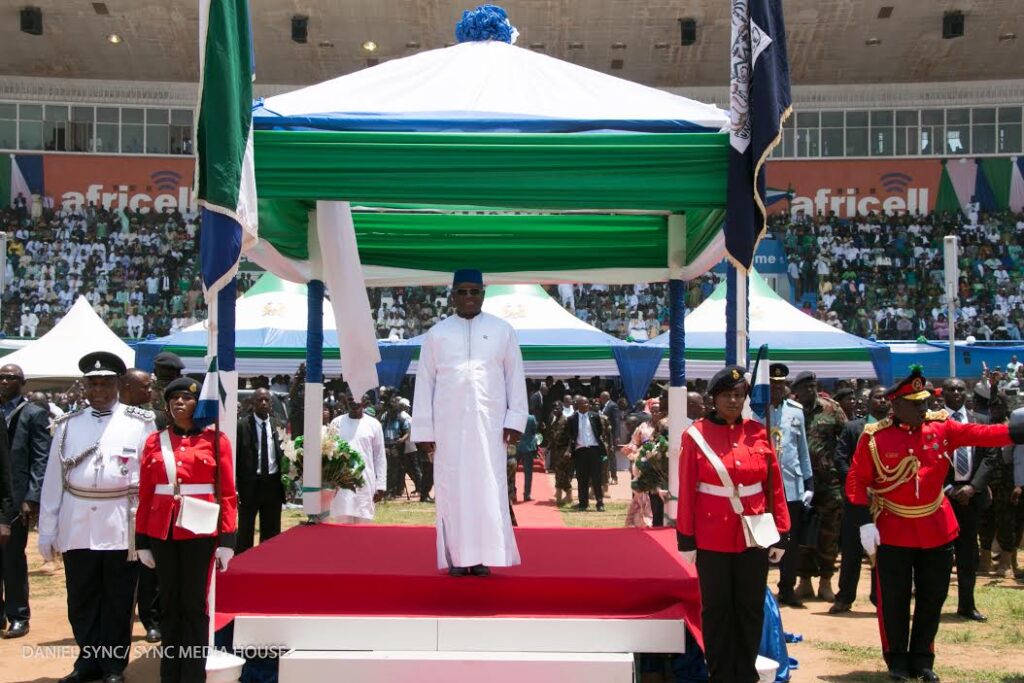The re-elected Dr Julius Maada Bio was, Tuesday, officially sworn in as the Sierra Leonean President at Freetown’s State House following his victory in the 2023 elections.
Commission chief Mohamed Kenewui Konneh said on Tuesday June 27, that Bio of the Sierra Leone People’s Party (SLPP) was re-elected with 56.17 percent of Saturday’s vote. His top challenger, Samura Mathew Wilson Kamara of the All People’s Congress (APC), came second with 41.16 percent.
More than 2.8 million votes were cast in last Saturday’s poll.
Bio’s programmes
In his address, President Bio emphasized the significance of the peaceful conduct of successive democratic elections, positioning Sierra Leone as a prominent example among young democracies.
He acknowledged the nation’s commitment to consolidating its democratic gains, making it a beacon of stability and democratic excellence worldwide.
The 59-year-old thanked the electorate for the trust placed in him and the Sierra Leone People’s Party (SLPP) to lead the nation for another term of five years.
He recognised the voters’ faith in his ability to continue the transformational work initiated by his government in 2018.
The President extended a hand of fellowship to the opposition leader, Dr Samura Kamara of the APC, and called for unity and invited political party leaders, civil society organizations, religious leaders, and traditional leaders to join hands in moving the country forward.
Highlighting the importance of collective effort, Bio emphasised that the task of nation-building requires the participation of all Sierra Leoneans.
The President acknowledged the need to blur the lines drawn during the campaign season and reunite as a united family, dedicated to building a brighter future for the nation.
He affirmed that the victory belongs to every Sierra Leonean who aspires for progress and a better future.
President Bio pledged to focus on food security, the consolidation of gains in Human Capital Development, job creation for young people, revamping the public service, and advancing technology and infrastructure.
However, the opposition APC flag bearer, Dr Kamara, commended individuals involved in the electoral process and lauded the contributions of local and international partners.
The re-election of Bio
The retired army brigadier took part in a military coup during the country’s civil war in 1992, only to overthrow the military junta itself in 1996 and pave the way for free elections that year.
Scenes of celebration have been reported in the capital, Freetown, with Mr Bio’s supporters hoisting his banner and marching across the wet streets of the city.
The rivalry between him and Dr Kamara, 72, was a repeat of the closely fought 2018 election, which went to a second round.
This time, Dr Kamara, who was the candidate for the All People’s Congress (APC), alleged that his electoral agents were not allowed to verify the ballot counting.
In the run-up to the vote, the APC had made complaints about the electoral commission. However, the commission insisted that it had mechanisms in place to ensure a fair vote.
The presidential, parliamentary and local council elections came at the end of a campaign marred by several violent incidents.
The election is the fifth since Sierra Leone’s 11-year civil war officially ended in 2002. It was a particularly brutal conflict, with 50,000 deaths and thousands of people estimated to have had their arms and limbs amputated.
In his second term, Bio is faced with endemic unemployment, rising cost of living, concerns about national unity and troubled economy caused by devalued currency.

